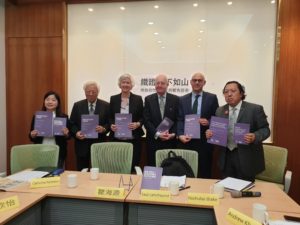
Reflections of a visit to Taiwan in 2019
- News
- 11 Apr 2019
Our Co-Executive Director Saul Lehrfreund looks back on his recent trip to Taiwan
Last month, we returned to Taiwan with Sir Nicholas Blake QC, former UK High Court Judge to meet with key stakeholders to promote reforms to the continued use of the death penalty in Taiwan. A key objective of our visit was to launch our latest publications on Taiwan: Unsafe convictions in capital cases in Taiwan by Carolyn Hoyle and a study of public attitudes towards the death penalty – For or against abolition of the death penalty: Evidence from Taiwan by Chiu Hei-Yuan and edited by Roger Hood. These publications were developed in collaboration with the Taiwan Alliance to End the Death Penalty (TAEDP).
During meetings with key stakeholders we conveyed the findings of our reports; developed to inform the debate on the death penalty in Taiwan and to confront the view that popular sentiment should not dictate penal policy, especially when many citizens base their opinions on misinformation and misconceptions about the administration of the death penalty.
Taiwan abolished the mandatory death penalty for all crimes in 2006 and judges now have the discretion to impose an alternative sentence to the death penalty. In 2009, Taiwan ratified the International Covenant on Civil and Political Rights (ICCPR) and the International Covenant on Economic, Social and Cultural Rights as a matter of domestic law. The legal consequence of the incorporation of the ICCPR into Taiwan’s legal order bears directly on the current use as well as the future of the death penalty. As a threshold matter, incorporating the ICCPR into the domestic law means that Taiwan must be on an “irrevocable path towards complete eradication of the death penalty”.
Taiwan was not on the list of countries that carried out executions in 2017, having not carried out any since President Tsai took office in May 2016. However, the execution of Lee Hung-chi on 31st August 2018 once again drew Taiwan’s policy on capital punishment into the international spotlight, with Taiwanese human rights groups joining the international community in condemning the execution. This was an unexpected development, as the stated policy of the Government is to gradually restrict the use of the death penalty pending its elimination. To carry out an execution after an unofficial moratorium had been in place for over two years, in addition to Taiwan’s obligations under the ICCPR, was an obvious step back for Taiwan.
Coinciding with our visit was the EU-Taiwan Judicial Exchange, an annual programme facilitating knowledge sharing on criminal justice and human rights between Taiwanese and European experts*. As part of the programme, we along with the European experts conducted a one-day training session at the Judges Academy focussing on the right to life, international human rights standards and sentencing principles.
We had a packed itinerary and were able to meet with key stakeholders including, government officials and prominent civil society actors. During meetings with Taiwanese NGOs, discussions focussed on how to create synergy between a group of diverse stakeholders, to develop new strategies and how to best address the key challenges surrounding the continued use of the death penalty. We were able to form new alliances with NGOs operating in vastly different sectors by facilitating knowledge sharing amongst different civil society groups in order to learn and share experiences. Andrew Khoo, co-Chair of the Constitutional Law Committee of the Bar Council Malaysia, kindly shared his experiences in Malaysia regarding the ongoing efforts to end the death penalty. This was pertinent given the announcement last year by the Malaysian Government that they would abolish the death penalty for all offences.
We also met with key ministers in the Executive Yuan as well as legislators and judges who engaged with us openly and frankly to discuss the future of the death penalty in Taiwan. The Ministry of Justice invited us to attend a session of the ‘Taskforce to Study on Gradual Abolition of the Death Penalty’. This provided a valuable opportunity to learn more about the role and work of the Taskforce and how we can assist them in developing a programme with clear terms of reference and a timetable for eventual abolition.
We were pleased to learn about the first Asian Human Rights Court Simulation (AHRCS) which was founded in October 2018, by scholars, legal practitioners and nongovernmental organisations in Asia. The AHRCS has been developed to provide a dynamic model of a regional human rights tribunal. AHRCS is a civil-society driven institution in which human rights principles and values are secured through transparent legal proceedings. We have subsequently been invited to join the AHRCS project as one of the co-organisers and to participate in future activities.
We have returned cautiously optimistic that the death penalty will eventually be abolished, and that Taiwan will become a leader for human rights in the region. We hope that our new publications will create new conversations, for example, citing public opinion as a reason why Taiwan cannot progress towards abolition in the immediate future can now be refuted through empirical evidence. The study on public attitudes towards the death penalty challenges the assumption that it is necessary to retain the death penalty because public opinion reflects a high level of support, interest and concern about the issue. Political leadership is crucial to ensure respect for human rights and the rule of law should always drive decision making.
Notes
* The delegation consisted of Mirjana Lazarova Trajkovska, former judge at the European Court of Human Rights; Sir Nicholas Blake, former Senior Judge of the UK High Court; Arndt Sinn, Professor of Law at the University of Osnabruck; Andrew Khoo, co-Chair of the Constitutional Law Committee of the Bar Council Malaysia; and, Saul Lehrfreund and Annette So of The Death Penalty Project.




















